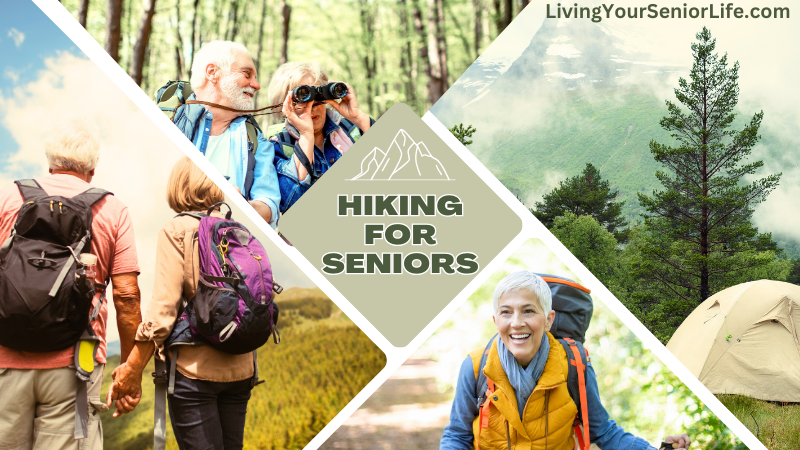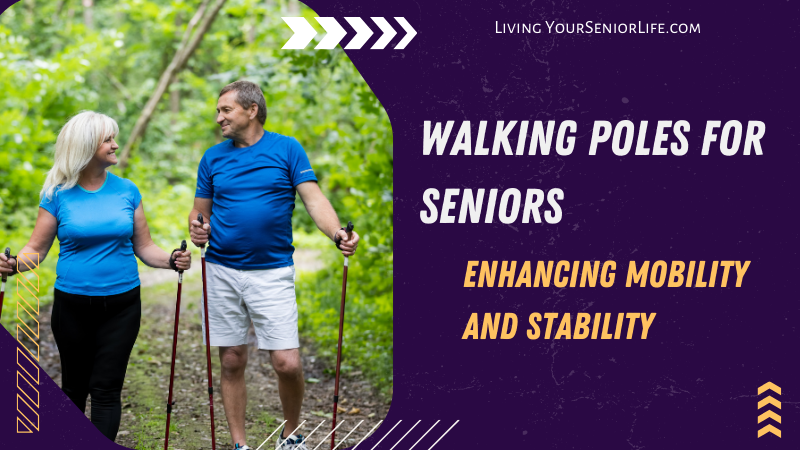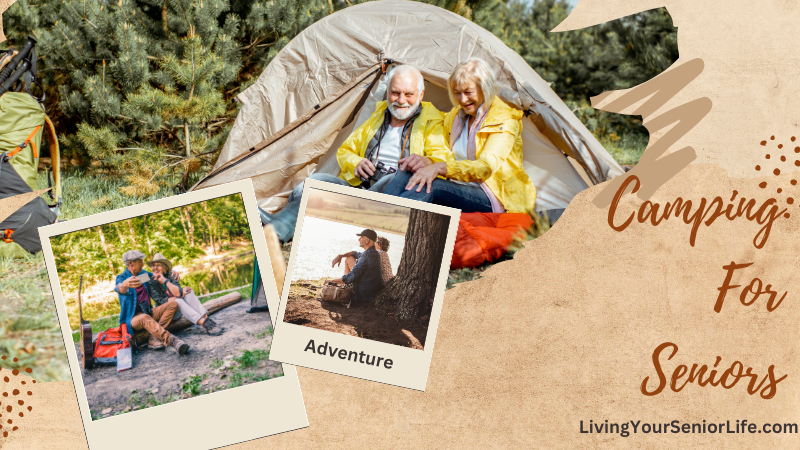Welcome to the world of hiking for seniors – a journey filled with preparation, discovery, and a myriad of benefits waiting to be unlocked. In this guide, we’ll delve into the essential aspects of hiking tailored for older adventurers. From practical preparedness tips to the invaluable health advantages and beyond, join us as we explore the enriching experience of hiking for seniors.
Whether you’re a seasoned trekker or venturing onto the trail for the first time, this comprehensive resource is designed to equip you with the knowledge and inspiration to embark on your hiking journey with confidence and excitement. So, lace up your boots, breathe in the fresh air, and let’s embark on this adventure together!
Key Takeaways:
- Hiking promotes physical and mental health benefits for seniors, offering a fun way to improve well-being.
- Proper preparation and safety are crucial, including hydration, weather awareness, and emergency readiness.
- Regular hiking fosters social connections and can be tailored to fit any senior’s fitness level and experience.
Overview
Hiking is increasingly popular among senior citizens as a way to stay active and enjoy the great outdoors. For older adults, connecting with nature through hiking can bring a host of benefits, including improvements in cardiovascular health and mental well-being. It’s a great way to explore different trails, soak in the fresh air, and appreciate the sights and sounds of the natural world. Whether it’s a long hike through national parks or short hikes closer to home, senior hikers often report a heightened sense of enjoyment and fulfillment. Hiking at one’s own pace allows for a personal connection with the environment and can be an integral part of living a healthy, active lifestyle in one’s golden years.
Embarking on a hike requires good planning, especially for older hikers, who may also benefit from shorter distances and less uneven terrain. It’s a good idea for senior citizens to check the weather forecast before heading out and to always carry a water bottle to ensure proper hydration. Bringing along a cell phone and first aid kit is advised for safety and in case of an emergency. For those new to hiking or with limited mobility, beginning with smaller trails and building up trail legs over time can lead to successful experiences, and visiting a visitor center can provide valuable insights and recommendations suited to every skill level. Professional caregivers and health professionals also recognize the valuable role of physical activities like hiking in maintaining not only physical health but also cognitive function in older people.
Preparing for a Hike
Embarking on a hike can be a great way to explore the great outdoors, but thorough preparation is crucial, especially for senior hikers. They should ensure their fitness and health are assessed, gear is carefully selected, and trails are understood before setting out.
For those new to hiking or with limited mobility, beginning with smaller trails and building up trail legs over time can lead to successful experiences, and visiting a visitor center can provide valuable insights and recommendations suited to every skill level.
Assessing Fitness and Health
Before planning any hikes, senior citizens should consult with a health professional to discuss their physical health and any health issues. This is a single most important thing to ensure that activities such as hiking do not exacerbate conditions like heart or joint pain. A doctor can advise on cardiovascular health, medication, and whether physical activities like short hikes are a good idea. It’s important to consider one’s own pace and not to compare with younger people or those with different fitness levels.
Selecting Appropriate Gear
Proper gear is essential for a successful hike. Comfortable shoes specifically designed as hiking shoes can prevent blisters and offer better support on uneven terrain. Clothing should be suited to weather conditions; layering is a good strategy. Always remember to pack a water bottle and enough food, like protein bars, to maintain energy levels. It’s also a good idea to have an emergency kit that includes a first aid kit, extra medication, and a cell phone for staying connected with family members or contacting help in case of an emergency.
- Gear Checklist:
- Sturdy hiking shoes
- Weather-appropriate clothing
- Backpack with water and food
- First aid kit
- Map and compass (or GPS)
- Cell phone
Understanding the Trail
Research and planning are essential, especially for older adults. It starts with selecting a trail that matches one’s physical fitness. For older hikers, shorter distances in national parks can be a great choice, providing an opportunity for both physical activity and social connections. Maps or information from a visitor center can inform about the trail’s length, elevation gain, and provide essential updates on trail conditions. Checking the weather forecast before heading out is also important to avoid any surprises. Trail information apps like AllTrails can be very useful for finding different trails suitable for senior citizens.
By ensuring physical health is in check, gearing up appropriately, and understanding the trail ahead, senior hikers can enjoy the immense benefits of hiking, from improved muscle strength to cardiovascular health and cognitive function. Hiking is not only a great outdoor activity for active seniors in their golden years, but it’s also a fun way to maintain a healthy weight and increase life expectancy, all while spending time in the fresh air surrounded by nature.
Hiking Techniques for Seniors
Incorporating the right hiking techniques can enhance physical health and ensure a successful hike for seniors. These methods focus on safety while maximizing the benefits of spending time in the great outdoors.
Maintaining Balance and Coordination
For senior hikers, maintaining balance is essential to navigating trails safely, especially on uneven terrain. It’s advised to engage in physical activities like yoga or tai chi that improve both balance and muscle strength. Footwear with good traction also helps older hikers stay stable and avoid falls. Prioritizing coordination through mindful walking can enhance a hiker’s ability to handle different trails with confidence.
Pacing and Distance Management
Managing one’s pace and distance is crucial, particularly for seniors who may be managing health issues or have limited mobility. Starting with short hikes and gradually increasing distance helps build endurance without overwhelming the body. Senior citizens should hike at their own pace and consider cardiovascular health when planning the length of a trail. It’s also a good idea to check the weather forecast before heading out and avoiding long hikes on extremely hot or cold days.
Using Hiking Poles and Trekking Poles
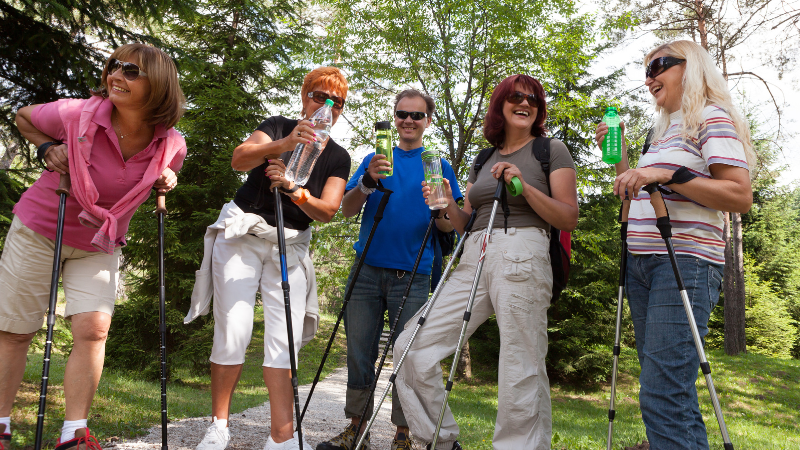
Hiking poles and trekking poles can be a senior’s best friend on the trail, offering additional support and reducing joint pain associated with walking for long periods. These tools assist with balance, especially during a long hike with significant elevation gain. For older adults who may experience knee pain, poles help distribute weight and reduce stress on the knees. They are also handy for testing the depth of a small stream or stability of a rock before stepping on it.
Safety and Emergency Preparedness
When it comes to hiking, especially for senior citizens, safety and emergency preparedness are paramount. These measures ensure that older hikers can enjoy the benefits of hiking, such as improved cardiovascular health and mental health, while minimizing risks.
Navigating Hazards
Older adults should acquaint themselves with potential hazards, such as uneven terrain and wildlife like mountain lions, which might be encountered while exploring different trails. Before setting out on a hike, it’s a good idea for seniors to check the weather forecast and prepare for any sudden weather conditions. Carrying a whistle and a flashlight or headlamp can provide protection in case of an emergency. Hikers should also consider their fitness level and any health issues, such as joint pain or heart conditions before selecting a trail, with shorter distances and smaller trails being a great choice for those new to hiking or with limited mobility.
Emergency Contact and First Aid
It’s essential for elder hikers to keep emergency contacts up to date, including family members and health professionals. A cell phone is a key item in an emergency kit, ensuring hikers have a means of communication. Hikers should also carry a comprehensive first aid kit containing bandages, antiseptics, and any medications specific to their health needs.
Senior hikers on a long trail may also find it a good planning strategy to inform the visitor center or national park service of their hike, especially if undertaking a multiday hike or navigating long days with notable elevation gain.
Hydration and Nutrition
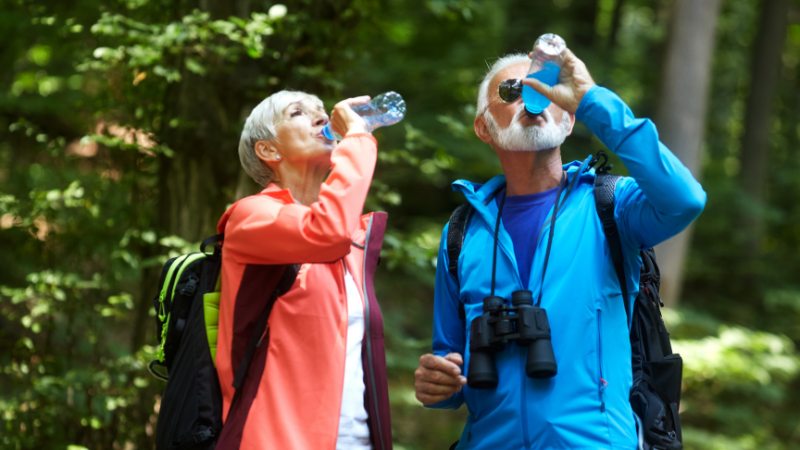
For senior hikers, maintaining proper hydration and nutrition is vital for overall health and to ensure a pleasant and safe hiking experience. It’s particularly important in avoiding dehydration and in providing the necessary energy levels for physical activities such as hiking.
Carrying and Consuming Water
Senior citizens should always carry a water bottle on short hikes and long trails alike. It’s the single most important thing to remember for maintaining hydration, as older people tend to have a lower amount of water in their bodies. Drinking water frequently is essential, and carrying an emergency kit with extra water is a good idea, especially in case of an emergency. Checking the weather forecast before leaving and being prepared for long days in the great outdoors can help in determining how much water to carry.
- How much to carry:
- For short hikes: at least 1 liter of water
- For multiday hikes or longer trails: 2-3 liters per day or more depending on weather conditions and physical activity
- Electrolyte replacement is also important for senior hikers, as it helps prevent imbalances that can lead to health issues such as dehydration or heat-related illnesses. Pack electrolyte powders or tablets to add to your water, especially if planning a long hike.
Choosing Nutritious Snacks and Meals
Nutrition is just as crucial as hydration. Senior citizens should opt for nutritious snacks and meals that support their physical health and energy requirements. Protein bars, nuts, dried fruits, and whole-grain sandwiches are all good food choices for steady energy release. They are easy to carry and consume even in the middle of a hike.
By focusing on both hydration and nutrition, senior hikers can savor their time in the great outdoors, enjoying the fresh air and scenery, all the while maintaining their health and enhancing their hiking experience.
Social and Mental Benefits of Hiking For Seniors
Hiking is increasingly popular among senior citizens as a way to stay active and enjoy the great outdoors. For older adults, connecting with nature through hiking can bring a host of benefits, including improvements in cardiovascular health and mental well-being.
Building Community and Friendship
Joining a hiking group can provide senior citizens with a sense of community and belonging. Many find that these groups offer more than just physical activity; they create space for lasting friendships and shared experiences. For older hikers, the Sierra Club or local hiking clubs can be a great place to meet individuals with similar interests. Most importantly, these social connections can enhance one’s sense of enjoyment and contribute positively to mental health during the golden years.
Improving Mental Health and Reducing Stress
Regular hiking is a proven strategy to combat stress and improve cognitive function among seniors. Engaging with the great outdoors provides fresh air and a change of scenery, which can be especially beneficial for combating depression and improving overall mood. Even short hikes in national parks can significantly boost mental health for active seniors. The repetitive nature of walking and the tranquil environment of trails often lead to reduced stress levels and a tranquil state of mind. Additionally, establishing a hiking routine promotes a healthy weight, good planning, and contributes to a longer life expectancy, all of which are important factors for maintaining mental health in older adults.
FAQs
This section provides essential questions and answers to help senior hikers navigate the various aspects of hiking, encompassing preparation, safety, and the numerous benefits associated with this fulfilling outdoor activity.
What are the best types of hikes for seniors with varying fitness levels?
For seniors with different fitness levels, short hikes on smaller trails or in national parks can be a great way to enjoy the outdoors. National Park Service offers a variety of different trails, ensuring there’s a suitable option for everyone, from flat and paved paths to those with slight elevation gain. It’s always good planning to start with a trail matching one’s fitness level and gradually work up to more challenging hikes.
How can seniors prepare physically for a hiking trip?
Physical preparation for a hiking trip can begin with regular physical activities, such as walking or swimming, to improve cardiovascular health and muscle strength. Consulting with a health professional may provide tailored advice for older adults, especially those with health issues or chronic conditions. It’s also a good idea for seniors to slowly increase their walks’ length in the weeks before a multiday hike.
What are the health benefits of hiking for individuals over 60 years of age?
Hiking is a great outdoor activity that can improve mental health and cognitive function, foster a healthy weight, and enhance physical health, including cardiovascular strength. Published studies, including those in the New England Journal of Medicine, have associated physical activity like hiking with increased life expectancy and better overall health for active seniors.
Parting Words
In conclusion, hiking is not merely a recreational pursuit but a transformative experience, especially for seniors. It’s a chance to reconnect with nature, engage with fellow hikers, and nurture both physical and mental well-being. With proper preparation, an understanding of one’s limitations, and a spirit of adventure, seniors can embark on hiking journeys that enrich their lives in countless ways. So, lace up your hiking boots, breathe in the fresh air, and take that first step onto the trail – the rewards await you. Happy hiking!
